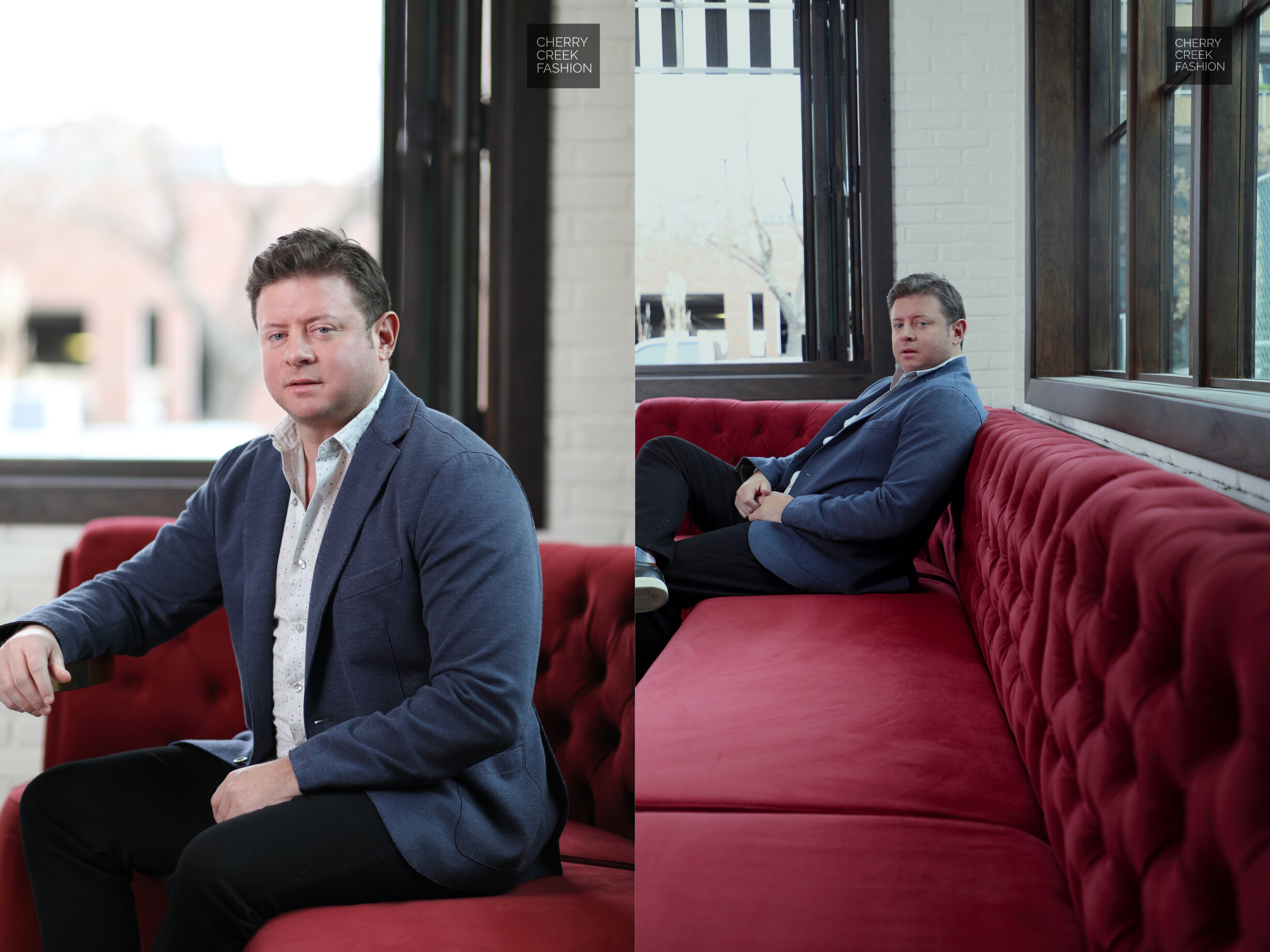Talking Business with Juan Padro of The Culinary Creative
WRITTEN BY MICHAEL SILVERMAN // BUSINESS & INNOVATION EDITOR
PHOTOGRAPHED BY ESTHER LEE LEACH
LOCATION: FORGET ME NOT, CHERRY CREEK
Our new Business & Innovation Editor is Michael Silverman, the Founder and Managing Director of Samantha Brands Group and the host of the podcast ‘What Didn’t Kill You With Michael Silverman’. This month, Michael interviews Juan Padro of The Culinary Creative. Juan and his partners have created some of the most innovative restaurant concepts including Morin, Ash’Kara, Bar Dough, Señor Bear, and the new Forget Me Not in Cherry Creek.
Michael Silverman: Juan, you came to the hospitality industry from an unconventional background, having been an executive recruiter and a senior consultant for large businesses before starting down this path. How has that background affected the way you've approached your bars and restaurants? Did it wind up being a helpful differentiator or did it steepen the learning curve?
Juan Padro: The biggest competitive differentiators for us are our core values and our talent. Speaking to the latter, coming from a background where I evaluated talent for a living, I learned that individual skills are secondary to characteristics in successful people. Those characteristics are emotional intelligence, empathy, and intellectual curiosity. As you can imagine, that translates well to the hospitality industry.
MS: You've spent extensive amounts of time volunteering in disaster recovery scenarios at home and abroad - could you share more about those experiences and how they prepared you to respond as well as you did to Covid-19 in your organization and for your people?
JP: My mentor, Dr. Alison Thompson is a world-renowned humanitarian. When hurricane Maria hit my father’s homeland of Puerto Rico, I was one of the first people on that island doing work. It was devastating to the point of having physical reactions; I remember my jaw literally locking and not being able to close my mouth. I was so stunned at what I saw. What I learned there was very helpful in responding to the first round of shutdowns and I felt very prepared. We are fortunate in America because the essentials such as water, light, a roof over our heads, and food are within reach. That was not the case in Puerto Rico. So when we shut down, we immediately set up a central command at one of our stores to feed all of our laid-off employees, their families, and anyone they lived with.
We covered health care expenses and we set up a tree where everyone in the company was spoken to every 48 hours because we wanted to get out ahead of the mental health issues people would be facing. We did an education on how to decipher good information from bad, where to source your data from etc. Then once we did that we turned our focus to our community and began feeding those in need. We were blessed to partner with the Colorado Restaurant Response to provide over 400,000 meals to frontline workers, industry professionals, and shelters. For that, the Colorado Restaurant Response was honored by the Colorado Restaurant Association recently as “philanthropists of the year”. I also worked with Dr. Thompson to secure over a million N95 masks for hospital workers nationwide, about 100,000 of which came to Colorado. Those were a combination of N95 and KN95 masks.
MS: Restaurants have been at the center of many conversations this year regarding Covid-19’s impact on small businesses, the people who rely on them for their livelihood, and the communities they support. Some operators, like Culinary Creative, have been able to weather the storm with much of their team intact, while others have not, or have survived only by having to part ways with most of their employees. Can you share what the biggest operational differences have been in your industry between those who have been able to keep operating through these challenging times and those who have not? And are there other groups in particular that you admire for their actions during these times?
JP: This is a tough one. I admire a lot of people and it’s not necessarily tied to who could keep their employees or not, it’s more in how they treated their people with empathy and continued to care for them when they were furloughed as well as how they put their community in many cases before themselves. During these times those that are less fortunate are disproportionately more at risk than those that are well off and can just work from home. The people that put themselves at risk and stood up for Denver I admire the most. Some of those businesses are Bar Helix owned by Kendra Anderson, Fetein Gebre-Michael from Konjo Ethiopian, Dana Rodriquez from Work and Class, Patrick O’Neil from Avanti Food and Beverage, and Katie Lazor, the Director of Eat Denver who let me tell you in all of my years evaluating talent for Wall Street banks and other fortune 100 companies she stands out to me at the top of any list of people I’d hire into any organization. There are more but these people stand out to me for making sacrifices and putting others in front of themselves.
“I think there is an excitement around Forget Me Not and the Clayton that is city-wide. I just want to do something that Cherry Creek is really proud of.”
MS: So much of the trendy restaurant and bar scene in Denver is concentrated on the North side of town in the Highlands and River North (as a number of your own establishments are). What made you want to open a concept like Forget Me Not in Cherry Creek and what effect will the larger Clayton Club development have on this area of town?
JP: I get asked this question almost daily. Cherry Creek is rooted in conflict. There are a handful of real estate titans and they seem to dictate the who and the what on this side of town. And frankly, that’s kept our incredible local chefs and operators away from Cherry Creek because it really has been real estate first, culture second over here. So when the opportunity presented itself to do something in Cherry Creek that was against the grain I started to poke around and eventually moved to this side of town to learn more about it. I think I’m like a lot of people in Denver who view Cherry Creek as almost foreign; I knew virtually every other big city in America more than I knew this part of Denver and I’ve lived here for 14 years. But for a few years, I was told by my partner that Cherry Creek was evolving and the needs were changing.
So I made the move to St. Paul Collection and have made this my home for 3 years. And what I’ve seen is really quite remarkable and it’s led me to believe that Cherry Creek will once again be one of the most exciting neighborhoods not only in Denver but the entire country. So I’m just rolling up my sleeves and filling in a few of the gaps that are necessary to make it an attractive night out for those from other parts of the city as well as the amazing local residents. People over here have been really amazing and helpful and I think there is an excitement around Forget Me Not and the Clayton that is city-wide. I just want to do something that Cherry Creek is really proud of. I don’t look at this as something that I own...it’s truly Cherry Creek’s.
MS: You have a number of planned openings coming up, including Forget Me Not in Cherry Creek and a Boulder location for the amazing Ash'kara (where as you know, I met my wife). What gives you the confidence to keep opening businesses in what many would consider a highly uncertain environment for most industries, particularly yours?
JP: Well, it is somewhat of a gamble for sure but they say you are the sum of the 5 people you surround yourself with the most and those people are a combination of partners and investors that are just so exceptional at what they do and in their support that I’m extremely bullish on our company. And we also have gotten tremendous support from our community and I can’t say enough just how humbled and grateful we are for that.
MS: You're currently in the midst of restructuring your organization and refining operations. What advice would you give to people getting started in the industry on how to think about both starting new concepts and expanding existing ones that seem like they're working? Any regular pitfalls to avoid?
JP: We can talk about this all day. But I’ll keep it simple; the first thing you need is a solid set of core values that you can manage your business around. Second, you need like-minded partners who challenge you. And finally, my business mentor Andy Campbell told me as I set out on this venture in a new industry “Just remember if you’re the smartest person in the room, you’re in the wrong fucking room”
Juan Padro: @jpad16
The Culinary Creative: @theculinarycreative
Writer: Michael Silverman: @silvermangrams
Photographer: Esther Lee Leach: @estherleeleach





